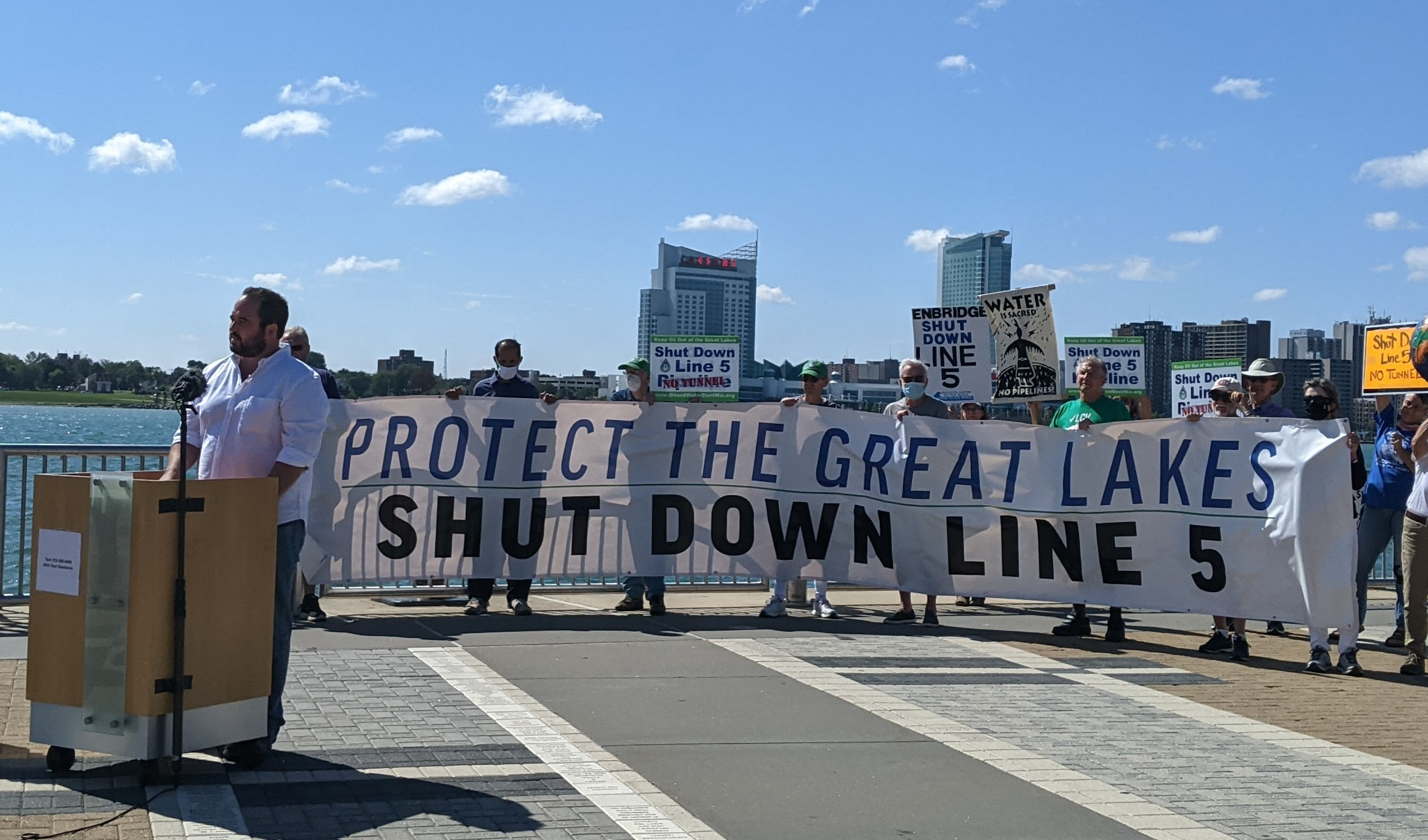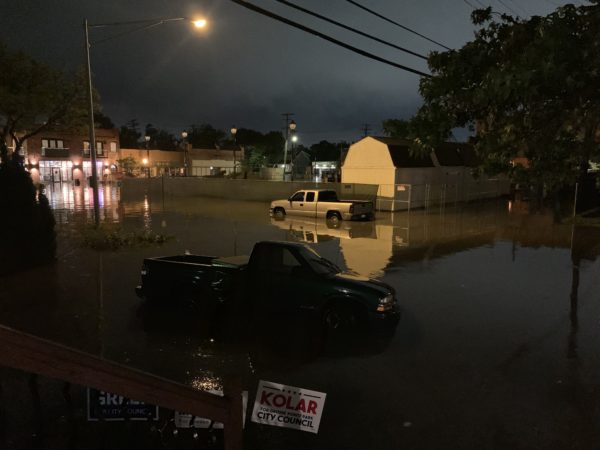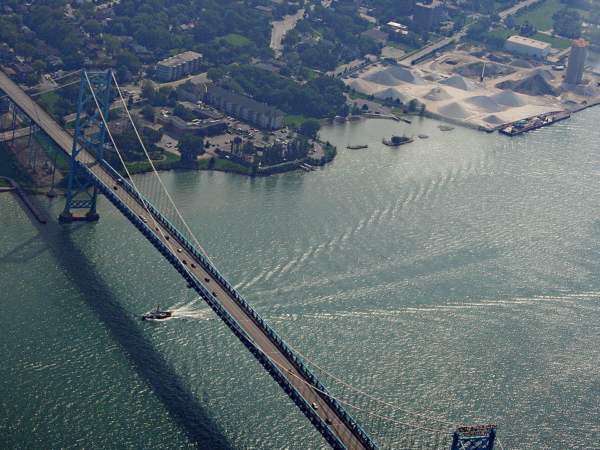
Michigan Gov. Gretchen Whitmer’s record on the Line 5 oil pipeline that traverses the Straits of Mackinac is mixed, according to Lansing advocate Sean McBrearty.
When running for governor in 2018, “Whitmer pledged to do everything in her power to take Line 5 out of the Great Lakes,” McBrearty told Great Lakes Now in a recent interview.
McBrearty is the campaign coordinator for the Oil and Water Don’t Mix coalition that has worked to shut down Line 5 since 2013. He also serves as the state director for the advocacy group Clean Water Action.
Early in her first term, Whitmer ordered a review of the easement that allows Enbridge to operate the pipeline going back to 1953. The review, conducted by the Department of Natural Resources, found that “the last time Enbridge was in compliance was 1968,” McBrearty said.
Whitmer eventually ordered Line 5 shutdown, Enbridge disputed the DNR’s findings and said it was reviewing the matter and plans “a more thorough response through the legal process,” Bridge Michigan reported.
“We were glad to see the governor go through that process and come out on the right side,” McBrearty said.
But over time, Whitmer moved to the background on Line 5 deferring to legal action brought by Attorney General Dana Nessel. Nessel’s legal challenge is currently before a federal appellate court. Not to determine an outcome, but to rule if the dispute will be decided by a state or federal court.
Now, McBrearty said he wants to see Whitmer return to be the “outspoken advocate who ordered the Line 5 shutdown and revoked the easement.”
He also wants her to use her high-profile relationship with President Biden to generate support from his administration, “It would be a wonderful thing for the people of Michigan and this campaign,” he said.
And there may be no more critical time for Whitmer to use her connection to Biden who, McBrearty says, “has all the authority he needs” to revoke Line 5’s right to operate.
Last week the Justice Department filed a 70 page brief in federal appellate court challenging a lower court’s decision to shutdown Line 5 in Wisconsin. The brief essentially aligns the federal government with Canada on Line 5. It contends that the lower court did not consider the U.S. and Canada treaty that governs pipelines and it didn’t adequately assess the public’s interest.
Previously, Biden Energy Secretary and former Michigan governor Jennifer Granholm has deferred to the president and Whitmer when asked about Line 5
Whitmer has recently worked with the Biden administration on energy issues.
In March, Granholm and Whitmer jointly announced a $1.5 billion federal loan to restart the aged Palisades nuclear power plant that borders Lake Michigan. Michigan is on track to provide $300 million for the restart. Environmental groups questioned the move citing the risk the plant brings to Lake Michigan and that financial investments to meet climate goals would be better spent on renewable energy.
Asked by Great Lakes Now about the Justice Department’s legal brief, McBrearty said it agreed with the position of Canada and Enbridge at the expense of the Bad River Tribe on whose land Enbridge is currently trespassing.
The brief is a selective reading of the U.S.-Canada treaty McBrearty said, citing provisions that it “shall be subject to appropriate governmental authorities” that would allow for environmental protection.
McBrearty said the brief is an opinion that doesn’t change the legal facts. “It also doesn’t change the fact that we’re courting disaster every day that Line 5 continues to operate,” he said.
In a lengthy statement, Enbridge spokesperson Ryan Duffy said, “the U.S. government has filed its amicus brief at the request of the court,” where it joins briefs filed by the Canadian government and others interested in “the ongoing delivery of safe, affordable and secure energy on both sides of the international border.”
“We appreciate that leaders in both Ottawa and Washington are engaged in the treaty resolution process and recognize Line 5 is critical energy infrastructure,” Duffy said.
The Canadian public and Trudeau
Enbridge is a Canadian company and much of the product that flows through Line 5 ends up in Sarnia, Ontario then eastward in Canada.
Great Lakes Now asked McBrearty how the Canadian public sees the Line 5 dispute between Michigan and Canada.
“The Canadian public has been characterized a bit on this issue by the messaging coming out of the administration of Prime Minister Justin Trudeau and the Canadian media,” according to McBrearty.
The Canadian media started paying attention to Line 5 when Gov. Whitmer revoked the easement and that happened suddenly. “There wasn’t a realization in the Canadian public that there had been a public debate ongoing in Michigan for seven years,” he said.
As Canadians became aware, they were receptive to considering both sides of the argument, according to McBrearty, who said, “well-meaning people on both sides of the border realize that we need a solution that doesn’t include a 70-year-old pipeline running through the Great Lakes.”
Canadian Prime Minister Justin Trudeau is an acknowledged leader on the world stage on climate issues, but can also be a pragmatist on phasing out fossil fuel.
Trudeau’s pragmatism was evidenced in 2019 when he authorized a new pipeline expansion and said “every dollar the federal government earns from this project will be invested in Canada’s clean energy transition.”
The Trudeau government supports the continued operation of Line 5 but McBrearty says Trudeau is “just wrong” on the issues.
Preceding the Justice Department’s legal brief, talks between the countries on resolving the treaty issue have been ongoing.
A long trip
Great Lakes Now asked McBrearty if in 2013 he thought Line 5 would still be operating over a decade later.
“I don’t think anybody anticipated that this pipeline would still be operating eleven years later,” said McBrearty. “And at every step of the way since 2013 we’ve seen different points where we thought we might be able to get the pipeline shut down.”
He acknowledged that there have been some rough moments over the years but said, “we went in clear-eyed knowing we were taking on one of the biggest industries in the world and that it wouldn’t be an easy fight.”
Catch more news at Great Lakes Now:
International nuclear energy expert questions Michigan’s Palisades restart
Featured image: Sean McBrearty. (Photo Credit: Jennifer Schlicht/Clean Water Action)




